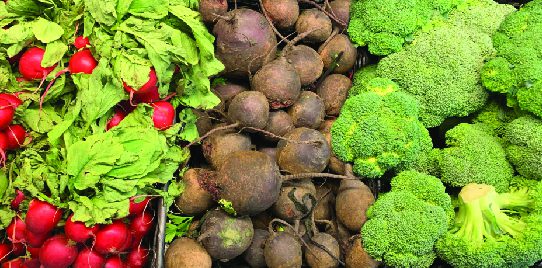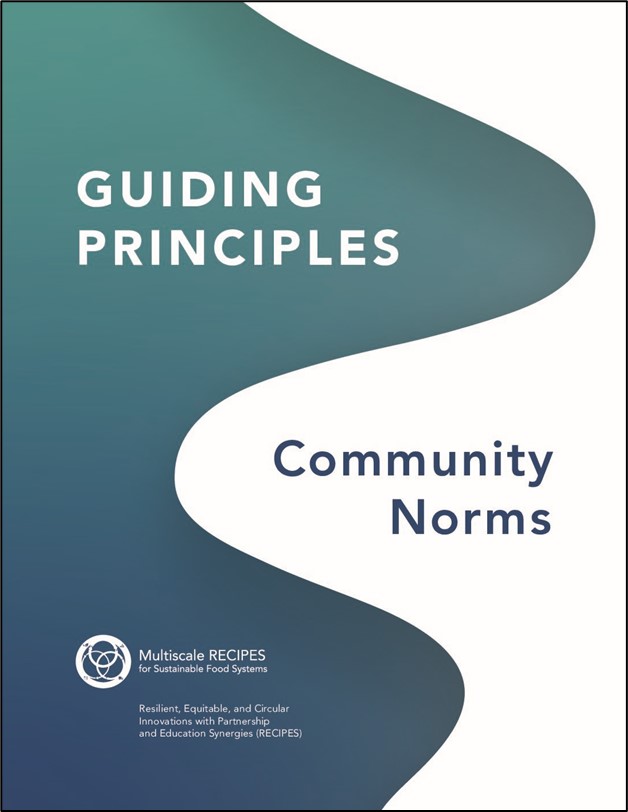Guiding Principles & Community Norms
Guiding Principles are based on our values, what we believe in and what is important to us. They are high level, inspirational and aspirational directions that inform our actions, decisions, and products.
Community Norms are how we put the Guiding Principles into action. They are specific and action oriented, meant to influence the day to day interaction. We can think of them as the equivalent to a Code of Conduct.
Table of Contents
Co-creation of knowledge
We believe in co-creating knowledge with our network members and partners, breaking down silos, and transcending boundaries of disciplines and hierarchies.
To achieve this goal requires new ways of collaborating, respect, and humility in the limits of our individual understandings and the potential of our collective knowledge.
Make knowledge, data, tools, and resources easy to use, understand, and access.
There may be limitations to private data and use agreements, with this in mind, the essence is to share what’s useful and beneficial for the community and the network, not necessarily particular proprietary information or data statistics.
Meet the audience where they are in terms of language. An example can be publishing outreach pieces as much as academic papers.
Learn from anyone and anything.
Be open and humble to leverage the knowledge and skills of those around you. You can be a learner and an expert at the same time.
Non-human organisms and systems also possess knowledge and experience. There is inherent value in nature we can learn from.
Putting people first
We believe in prioritizing people over projects. Always seeking to understand their needs and building authentic relationships.
We value and respect lived experience. Therefore, we involve the network and the community in every step of the project (research or innovation) that we undertake. Always remember: in order to show up for others, we must also take care of ourselves.
Value and respect people, their skills, talent, and knowledge.
Trust network peers and the skillset they bring. Elevate and value the lived experiences and knowledge the community is providing.
Make sure to provide appropriate credit for the knowledge you receive from the community or the network. This may take different forms in projects and should be the result of conversations between the people involved.
Equal access and participation
We believe in challenging power dynamics and hierarchies to build a space where people feel comfortable participating and initiating honest conversations.
We strive for equal participation, creating accessible and equitable opportunities that benefit each person, setting an example for academia and broader society.
Check your power and privilege.
We all have or lack privileges and power that come from our current position: somebody might have more privileges in society but less power in the network; somebody may have power in the network but fewer privileges in society. Acknowledge the struggles of other groups and examine the advantages of your own life.
Share power when possible and always use power for the benefit of all.
Openness and Transparency
We believe in building structures and fostering an environment that encourages openness of intentions, who you are, and what you are doing.
This will help to empower people to be vulnerable in turn cultivating trust and credibility of our outputs among the network, its partners, and the community.
Communicate clearly, early, and often.
State your expectations and needs clearly and early with your team. Create and foster structures for people to provide and implement feedback.
Clarify when you need help, opposed to support or just guidance.
Provide updates about the project, process, and findings. Engage people as you make progress, especially when you’re working with community partners.
Actions are Greater Than Statements
We believe that statements matter and are also more impactful if they lead to real action. We work to build a culture of accountability where everybody is committed to achieving our shared goals and objectives, translating them into processes that lead to action.
Follow through on your commitments.
Timelines and deliverables require commitment, flexibility, and communication. We understand that life happens, so make sure you let people who are depending on you know when you cannot meet a commitment and find a solution that works for everyone involved.
When setting timelines and deliverables, work with the team to set realistic and reasonable expectations about what can be accomplished in what timeframe.
Restorative, not punitive
We believe in repairing rather than punishing and blaming. Where conflicts arise and harm is done (intentionally or by error), we will try to find ways to create dialogue to bring people together to resolve conflict and repair ruptured relationships.
Restorative processes are an opportunity for those who have caused harm to understand the source of their behavior, take responsibility for their choices, and learn from the experience despite the outcomes, leading to growth.
Own your impact and seek to repair harm.
There may be limitations to private data and use agreements. With this in mind, the essence is to share what’s useful and beneficial for the community and the network, not necessarily particular proprietary information or data statistics.
Meet the audience where they are in terms of language. An example can be publishing outreach pieces as much as academic papers.
Be direct, caring, and empathetic.
When there’s disagreement, engage in dialogue and seek to understand rather than tear down.
For feedback and critique, express your thoughts on how well ideas relate to the common goal or aligned objective rather than putting them down.
Regenerative, not extractive
We believe in circularity, in finding a balance between giving and taking both in nature and in the relationships we engage in.
We aim to unlearn extractive research practices, recall old ones while building new practices that are mutually-beneficial and care-driven.
Take space and give space.
We understand people have different levels of comfort participating in different settings.
We encourage people who participate frequently to give space for those who don’t. For those who are hesitant, participation can take different forms. Ensure your feedback or inputs are acknowledged and accounted for.
Be reciprocal, whenever possible share your resources.
Be generous with your time and knowledge. Share what you can with network members and community partners. Based on your capacity, it can be mentoring, connections, and access to resources.
Think about mutually-beneficial processes, initiatives, or ways to give back to the community or network as a whole.
RECIPES Guiding Principles and Community Norms Feedback, PDF, and Citation
There is no clear cut answer on how to implement these Guiding Principles and Community Norms; we are learning as we go.
Please share your experiences and feedback as we all work to incorporate them in our work, in our Network meetings, and in our clusters. This feedback will be used to organize intentional conversations and gatherings to agree on updates. You can share feedback via email to wastedfood@american.edu and the coordination team will direct it to the best channel, whether it’s suggesting to change a word or a more substantial proposal. For network members, post your thoughts and comments in the Teams channel #PrinciplesandNorms. This is also a place for you to engage in conversation with other team members to discuss what you think is working or not.
The RECIPES Guiding Principles and Community Norms are also available as a PDF.
Please feel free to download a copy to keep on your computer, print, or share with others!
If you would like to cite the RECIPES Guiding Principles and Community Norms as a reference, please use the following information:
Cite as:
Agarwalla, V.; Davis, L.; Duhart Benevides, E.; RECIPES Network (2024) Guiding Principles and Community Norms. RECIPES doi: 10.57912/25299325
Funder Statement:
This work was supported by National Science Foundation (NSF) Grant # 2115405 SRS RN: Multiscale RECIPES (Resilient, Equitable, and Circular Innovations with Partnership and Education Synergies)
for Sustainable Food Systems. Opinions expressed herein are those of the authors and do not necessarily reflect the views of NSF.
Creative Commons License:
This work is licensed under the Creative Commons BY-NC-SA License. To view a copy of the license, please visit creativecommons.org/licenses/by-nc-sa/4.0/

